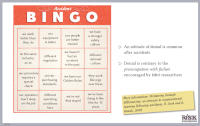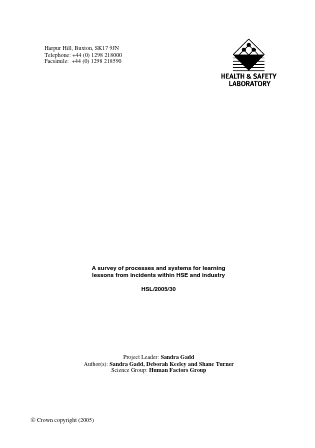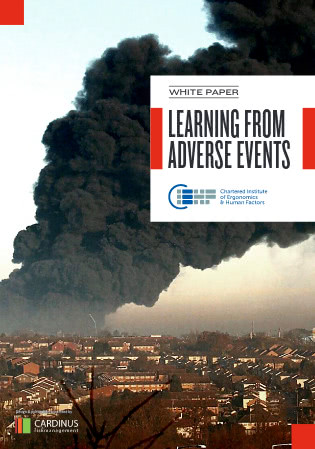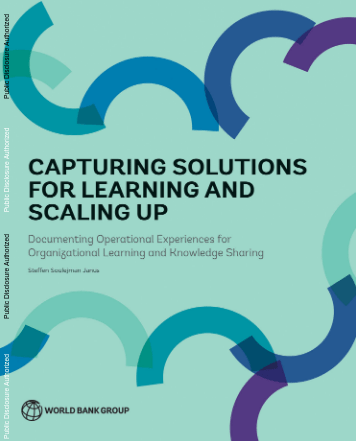Learning from incidents and accidents
The gift of failure
Overview
 Learning from
accidents is the acquisition of knowledge and skills from a thorough
study of accidents and their antecedents. The knowledge acquired may
concern the types of unwanted events and near misses which may occur,
the factors that can contribute to these unwanted events, the barriers
which can prevent their occurrence, the possible consequences of the
unwanted events, and the protective measures which can limit their
consequences.
Learning from
accidents is the acquisition of knowledge and skills from a thorough
study of accidents and their antecedents. The knowledge acquired may
concern the types of unwanted events and near misses which may occur,
the factors that can contribute to these unwanted events, the barriers
which can prevent their occurrence, the possible consequences of the
unwanted events, and the protective measures which can limit their
consequences.
Operational experience feedback is a structured process aiming to learn from past events in order better to control the future:
- collect information on anomalies, deviations, near misses, incidents and accidents
- analyze the sequence of events and their causality
- extract new knowledge or learning from the analysis
- implement corrective actions or action plans
- share the learning with all interested parties
- record the learning so that it can help people in the future
This module describes how organizations can implement an operational experience feedback process (or related continuous improvement practices such as after-event reviews), and discusses a number of barriers to learning which hinder the effectiveness of this process in improving safety in the long term.
Course material
 |
Learning from incidents and accidents |
Operational experience feedback and learning from unwanted events, incidents and accidents are important sources of progress in safety management. A number of obstacles tend to decrease the effectiveness of learning from experience. We describe some symptoms of failure to learn, such as under-reporting and fixation on immediate causes, then describe underlying pathogenic organizational factors that can be responsible for the symptoms of ineffective learning.
Several steps are required to achieve learning:
- reporting
- analysis
- planning corrective actions
- implementing corrective actions (including information sharing)
- monitoring their effectiveness
Obstacles (technical, organizational or related to the organizational culture) may appear within each step, and learning is not effective unless every step is completed.
From an operational standpoint, these slides aim to help practitioners to identify opportunities for improving their event learning process. They should be useful in the context of a process review of your organization’s learning system.
 |
Barriers to learning from experience |
The symptoms of ineffective organizational learning discussed in the slides, that can be observed by an informed observer or auditor who examines a company’s learning system, are:
- Under-reporting
- Analyses stop at immediate causes
- Self-centeredness
- Ineffective followup on recommendations
- No evaluation of effectiveness of actions
- Lack of feedback to operators’ mental models of system safety
- Loss of knowledge/expertise (amnesia)
- Bad news are not welcome
- Ritualization of experience feedback procedures
These symptoms reflect a number of pathogenic organizational conditions that hinder effective learning:
- Denial
- Complacency
- Resistance to change
- Inappropriate organizational beliefs
- Overconfidence in the investigation team’s capabilities
- Anxiety or fear
- Corporate dilemma between learning and fear of liability
- Lack of psychological safety
- Self-censorship
- Cultural lack of experience of criticism
- Drift into failure
- Inadequate communication
- Conflicting messages
- Pursuit of the wrong kind of excellence
Other resources
We recommend the following sources of further information on this topic:
 UK HSE
report A survey
of processes and systems for learning lessons from incidents within HSE
and industry, UK Health and Safety Executive, 2005
UK HSE
report A survey
of processes and systems for learning lessons from incidents within HSE
and industry, UK Health and Safety Executive, 2005 A white
paper on learning from adverse events by the UK Chartered Institute
of Ergonomics and Human Factors (CIEHF)
A white
paper on learning from adverse events by the UK Chartered Institute
of Ergonomics and Human Factors (CIEHF)ESReDA documents on Dynamic learning as the followup from safety investigations
Concept notes from the Flight Safety Foundation on learning from all operations, concerning issues such as resilience and adaptation.
FonCSI reports on operational experience feedback (in French) and its sociocultural success factors
Oxford Research Encyclopedia entry Collective Knowledge for Industrial Disaster Prevention
A collection of plane crash writeups by “Admiral Cloudberg”
 World Bank
report Capturing
solutions for learning and scaling up: Documenting Operational
Experiences for Organizational Learning and Knowledge
Sharing
World Bank
report Capturing
solutions for learning and scaling up: Documenting Operational
Experiences for Organizational Learning and Knowledge
SharingEnergy Institute Guidance Learning from incidents, accidents and events (website registration needed)
PhD dissertation of Bruno Verweijen (2018) Learning from disaster? Processes of contestation in an organizational field in the wake of an extreme event, which analyses the politics of learning, seen as a power struggle, after the Macondo accident.
Published:
Last updated: